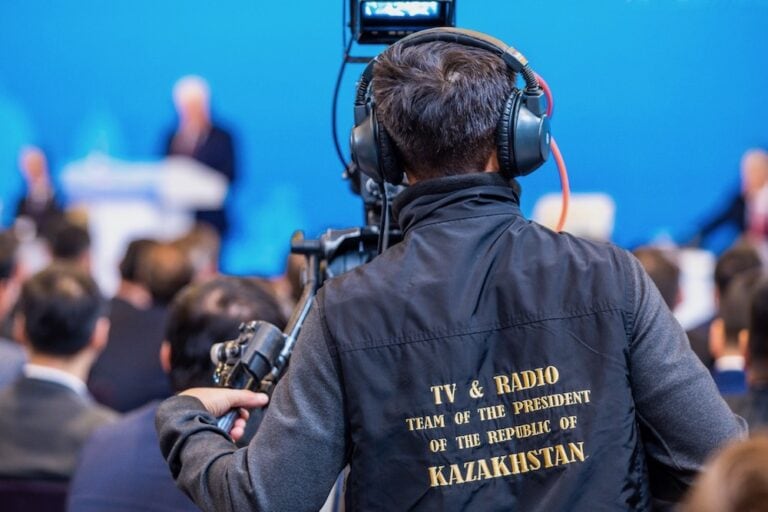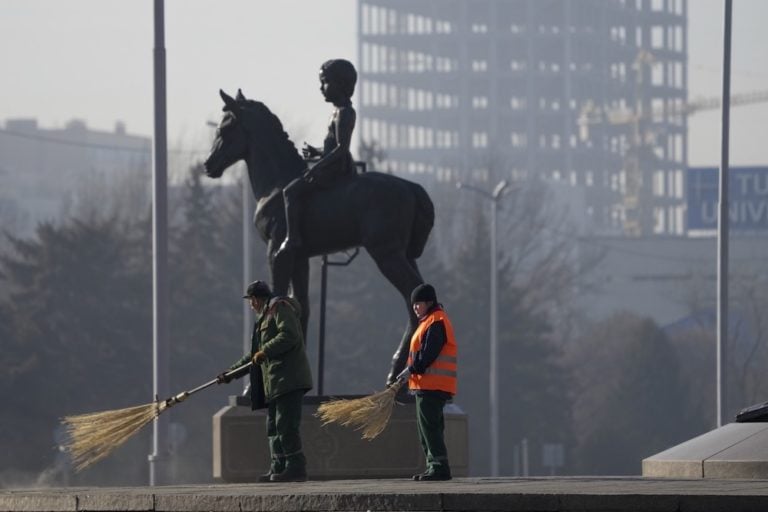Some of the blogs on the portal allegedly violated the law on "disseminating materials containing propaganda for terrorism, religious extremism, and incitement to commit acts of terrorism".
(Adil Soz/IFEX) – The Kazakh authorities have banned the popular LiveJournal portal ( http://LiveJournal.com ), some of its blogs, and other sites (14 in total) for “terrorism and religious extremism propaganda”. The court’s decision came into effect on 12 July 2011. The blogs and sites were suspended for at least three months.
Aylana Iskendirova, the official representative of the Astana City Court, explained that a complaint was filed by the Astana City Prosecutor after some blogs and sites allegedly violated the law on disseminating materials containing propaganda for terrorism, religious extremism, and public incitement to commit acts of terrorism.
Internet users, however, expressed concern over blocking of the whole Internet portal.
Svetlana Ivannikova, the head of LiveJournal’s Russian branch, stated that none of the Kazakh state bodies communicated with her or sent requests urging her to remove “extremist” content from LiveJournal. “We are not aware of the court’s decision since we neither received any official document from the court nor saw any related details on the Court’s website. We have no idea what might be the reason for LiveJournal’s suspension. However if some blogs or sites are deemed to be disseminating information designed to stir up national hatred, or advocate violence, our response is always very fast. But I would like to repeat, we didn’t receive any official notification from the Kazakh authorities.”
Adil Soz, the International Foundation for Protection of Freedom of Speech, also questioned the decision for the ban since the court did not present any evidence to support the allegation that some of the blogs on LiveJournal were guilty of disseminating “extremist” information. “The Court decision to ban the whole portal violates the right of Internet users to access information and to disseminate information freely. The decision to ban the whole portal can be compared to the arrest of a whole family for the crime of one of its individual members,” says Adil Soz.
This is not the first time that Kazakh authorities have blocked the LiveJournal.com portal and other foreign and Kazakh sites. Experts believe that one possible reason might be that such sites are often critical of Kazakh authorities.
Access to the LiveJournal.com site was first blocked in October 2008 by the state controlled “Kazakhtelecom” and “Nursat”, the two main Internet service providers in Kazakhstan. No official explanation was provided at the time. LiveJournal.com remained blocked for two years until the ban was finally lifted on 13 November 2010.
Experts believe that the current ban may be linked to the fact that LiveJournal.com contains the blog of Rakhat Aliyev, a former son-in-law of Kazakh President Nursultan Nazarbaev. The blog contains compromising information about Kazakh officials.
BACKGROUND:
Access to the site of opposition newspaper “Respublika”, which covers corruption in Kazakhstan and other controversial topics, has repeatedly been denied to Kazakh Internet users.
In June 2011, access to the blog tool and publishing platform WordPress was blocked. Murat Abenov, deputy of the Majlis (the lower legislative chamber of the Kazakh Parliament) who is also an active blogger on Wordpress, sent an official request to “Kazakhtelecom” asking them to provide a valid explanation for the blocking. The Internet service provider replied that the court’s decision to ban a few WordPress blogs was based on the fact that they had violated the law. The decision was actually taken by the court in February 2011, but bloggers were unaware of it. “Kazakhtelecom” then decided to block an entire WordPress platform instead of blocking just a few “improper” blogs.
In May 2010, participants in the campaign “For Free Internet” from 15 regions in Kazakhstan, including Astana, and Almaty, filed more than 120 lawsuits against the Ministry of Communication and Information. The reason for the lawsuits is the limited access to some Internet resources, including LiveJournal.com. The sites were blocked despite a legal stipulation that any decision regarding the closing of Internet sites should be taken either by the site’s owner or by the court. The campaign urged the ministry to take action to ensure that Kazakh Internet users can exercise their constitutional rights to access information freely, and put an end to the blocking of sites. In most cases, the courts either refused to consider the claims, or rejected them.
Sergey Rasov, an Internet user from Karaganda (Northern Kazakhstan), sent a request to AsiaBell, a privately owned ISP, asking them to provide an explanation as to why he did not have access to some websites. AsiaBell replied that access to such sites as ferghana.ru, centrasia.ru and livejournal.ru was blocked following a National Security order.
Kazakh opposition sites and other sites having a social and political orientation are either targets of DDoS attacks or extrajudicial punishment (i.e. the sites are blocked without an official court decision). Often site owners do not receive any official warnings, whether from ISPs or the courts. Authorities routinely deny any implication in the blocking of these sites.
Prominent opposition journalist and activist Gulzhan Yergalieva launched her site www.guljan.org in May 2011. The site quickly became very popular. In July 2011, Yergalieva was forced to remove her site from the “Kaznet” zone because of constantly growing DDoS attacks. Research showed that such attacks came from either “Kazakhtelecom” or “Almatytelecom”.
Police raids and visits by representatives of government agencies to the offices of opposition sites are not uncommon. Usually officials use trumped-up reasons. This was the case on 19 August 2011, when representatives of the Fire Department visited the offices of the Stan.kz portal. Experts believe that the reason for the unscheduled inspection was to find an excuse for closing down the portal, since it systematically covers controversial topics, such as an oil workers’ strike in Western Kazakhstan.
The Kazakh law regulating online content that came into force in 2009 stifles criticism. It defines blogs, chat rooms, forums, online journals and other Internet resources as “mass media”, and stipulates that these must therefore be treated and prosecuted as mass media if they violate the law.
Adil Soz has repeatedly issued statements urging the government to repeal or amend this law, and to stop blocking Internet sites without an official court ruling.


